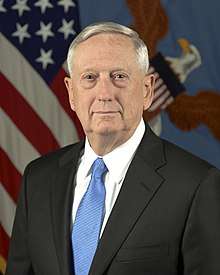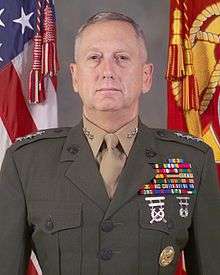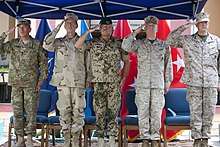
James Norman Mattis (born September 8, 1950) is a retired United States Marine Corps general who was the 26th United States Secretary of Defense, serving in the Cabinet of Donald Trump. Mattis was previously the 11th Commander of United States Central Command during the presidency of Barack Obama, and was responsible for American military operations in the Middle East, Northeast Africa, and Central Asia.
Quotes
- To risk death willingly, to venture forth knowing that in so doing you may cease to exist is an unnatural act. To take the life of a fellow human being or to watch your closet comrades die exacts a profound emotional toll.
- Excerpt from Call Sign Chaos: Learning to Lead pg 31
- Remember, I don't have stress; I create it.
- Speech at the Virginia Military Institute on September 25, 2018
- John Dickerson: What keeps you awake at night?
James Mattis: Nothing, I keep other people awake at night.- Exchange in an interview between John Dickerson and James Mattis on CBS' "Face the Nation" on May 28, 2017.
.jpg)

"Nothing, I keep other people awake at night."
- Combining al Qaeda's significant fighting capabilities with a stronger focus on the administrative capabilities that might permit it to hold ground, the Islamic State copied the latter from Hezbollah's model. Basically, Islamic State is a combined al Qaeda and Lebanese Hezbollah on steroids, destabilizing the region, dissolving borders/changing the political geography in the mid-east, and hardening political positions that make mid-east peace-building more remote by the day.
- General Mattis [Ret.] speaking about the Islamic State of the Levant in an interview with Business Insider

- When you were the commander of the Central Command, how much time, worry did you have on Iran? Was that your primary concern?
I don't have worry and stress. I cause worry and stress.- CNN journalist Wolf Blitzer and James Mattis on July 20, 2013, in an interview conducted live on CNN about Mattis, his experiences as a senior commander in the Marine Corps, and his perspectives on modern issues of defense.
- The first time you blow someone away is not an insignificant event. That said, there are some assholes in the world that just need to be shot. There are hunters and there are victims. By your discipline, cunning, obedience and alertness, you will decide if you are a hunter or a victim. It’s really a hell of a lot of fun. You’re gonna have a blast out here!
- There is only one ‘retirement plan’ for terrorists.
- Good afternoon, Marines. Thank you for your attention so late on a Friday. I know the women of Southern California are waiting for you, so I won't waste your time.
- Opening remark made by Mattis in an address of 1st Reconnaissance Battalion Marines at Camp Pendleton in September 2002. As quoted by Nathaniel Fick, One Bullet Away: The Making of a Marine Officer (2005), p. 163.
- For all the ‘4th Generation of War’ intellectuals running around today saying that the nature of war has fundamentally changed, the tactics are wholly new, etc., I must respectfully say, ‘Not really’: Alexander the Great would not be in the least bit perplexed by the enemy that we face right now in Iraq, and our leaders going into this fight do their troops a disservice by not studying — studying, vice just reading — the men who have gone before us. We have been fighting on this planet for 5,000 years and we should take advantage of their experience. ‘Winging it’ and filling body bags as we sort out what works reminds us of the moral dictates and the cost of incompetence in our profession.
- You go into Afghanistan, you got guys who slap women around for five years because they didn't wear a veil. You know, guys like that ain't got no manhood left anyway. So it's a hell of a lot of fun to shoot them. Actually it's quite fun to fight them, you know. It's a hell of a hoot. It's fun to shoot some people. I'll be right up there with you. I like brawling.
- Panel discussion in San Diego, California (1 February 2005) as quoted in "General: It's 'fun to shoot some people'" CNN (4 February 2005)(For a more contextualized explanation of General Mattis' remarks, see this essay by one of the Marines who served under Mattis: "Breaking the Warrior Code" The American Spectator (February 11, 2005) by John R. Guardiano
- For decades, Saddam Hussein has tortured, imprisoned, raped and murdered the Iraqi people; invaded neighboring countries without provocation; and threatened the world with weapons of mass destruction. The time has come to end his reign of terror. On your young shoulders rest the hopes of mankind. When I give you the word, together we will cross the Line of Departure, close with those forces that choose to fight, and destroy them. Our fight is not with the Iraqi people, nor is it with members of the Iraqi army who choose to surrender. While we will move swiftly and aggressively against those who resist, we will treat all others with decency, demonstrating chivalry and soldierly compassion for people who have endured a lifetime under Saddam’s oppression. Chemical attack, treachery, and use of the innocent as human shields can be expected, as can other unethical tactics. Take it all in stride. Be the hunter, not the hunted: never allow your unit to be caught with its guard down. Use good judgment and act in best interests of our Nation. You are part of the world’s most feared and trusted force. Engage your brain before you engage your weapon. Share your courage with each other as we enter the uncertain terrain north of the Line of Departure. Keep faith in your comrades on your left and right and Marine Air overhead. Fight with a happy heart and strong spirit. For the mission’s sake, our country’s sake, and the sake of the men who carried the Division’s colors in the past battles-who fought for life and never lost their nerve-carry out your mission and keep your honor clean. Demonstrate to the world there is "No Better Friend, No Worse Enemy" than a U.S. Marine.
- Mattis' words in a message to the 1st Marine Division in March 2003, on the eve of the Iraq War, as quoted in "Eve of Battle Speech" in The Weekly Standard (1 March 2003); also quoted in War Stories: Operation Iraqi Freedom (2003) by Oliver North, p. 53

- Be polite, be professional, but have a plan to kill everybody you meet.
- One of the rules Maj. Gen. James Mattis gave his Marines to live by in Iraq, as quoted in Fiasco: The American Military Adventure in Iraq (2006) by Thomas E. Ricks; as excerpted in Armed Forces Journal (August 2006)

- I come in peace. I didn’t bring artillery. But I’m pleading with you, with tears in my eyes: If you fuck with me, I’ll kill you all.
- After the invasion of Iraq -and after sending his tanks and artillery home- Mattis sent this message to the Iraqi leaders in every area his men served in, as quoted in Fiasco: The American Military Adventure in Iraq (2006) by Thomas E. Ricks; as excerpted in Armed Forces Journal (August 2006)
- None of the widely touted new technologies and weapons systems "would have helped me in the last three years [in Iraq and Afghanistan]. But I could have used cultural training [and] language training. I could have used more products from American universities [who] understood the world does not revolve around America and [who] embrace coalitions and allies for all of the strengths that they bring us."
- Speaking at a professional conference on military transformation, urging the Pentagon to invest in efforts that would "diminish the conditions that drive people to sign up for these kinds of insurgencies." Breaking the Warrior Code (February 2005)

- In this age, I don’t care how tactically or operationally brilliant you are, if you cannot create harmony—even vicious harmony—on the battlefield based on trust across service lines, across coalition and national lines, and across civilian/military lines, you need to go home, because your leadership is obsolete. We have got to have officers who can create harmony across all those lines.
- At the May 2010 JFCOM Conference Ares blog, Aviation Week (June 2010)
- PowerPoint makes us stupid.
- Referring to the ubiquitous presentation software at a brief in North Carolina in April 2010, as quoted in We Have Met the Enemy and He Is PowerPoint (2010) by Elisabeth Bumiller, The New York Times
- "I have the forces to squash the Iran military if I need to; but I've seen a lot of war and really don't want to kill young Iranian boys,"
- Mattis said responding to a question during a conference at the Mayflower Hotel in Washington in the spring of 2011.[specific citation needed]
- Treachery has existed as long as there’s been warfare, and there’s always been a few people that you couldn’t trust.
- In response to a question during a congressional hearing about whether the U.S. should modify its Afghan strategy in response to six U.S. soldiers being killed by Afghan soldiers between Feb. 23 and March 1. As quoted in Key commanders have their say on Afghanistan (2012) by Walter Pincus, The Washington Post
- I think the rewards for moral courage are promotion. ... Any institution gets the behavior it rewards. Now if the institution gets rotten, you can have a problem with this. It's happened to institutions, it's happened to corporations. It's why you have to be very alert to this to keep your personal and managerial integrity.
- Interview with David Brooks 9/6/2019, time code 48:00
March 2013 speech in Congress
If you don’t fund the State Department fully, then I need to buy more ammunition, ultimately. So I think it’s a cost-benefit ratio. The more that we put into the State Department’s diplomacy, hopefully the less we have to put into a military budget as we deal with the outcome of an apparent American withdrawal from the international scene.[1]
December 31, 2018 DOD memo
Message sent from Mattis on 31 December 2018, his last day as Secretary of Defense, to all members of the U.S. Department of Defense.[citation needed]
- MEMORANDUM FOR THE DEPARTMENT OF DEFENSE
- SUBJECT: Farewell Message
- On February 1, 1865, President Lincoln sent General Ulysses S. Grant a one sentence telegram. It read: "Let nothing which is transpiring change, hinder, or delay your military movements, or plans." Our Department's leadership, civilian and military, remains in the best possible hands. I am confident that each of you remains undistracted from our sworn mission to support and defend the Constitution while protecting our way of life. Our Department is proven to be at its best when the times are most difficult. So keep the faith in our country and hold fast, alongside our allies, aligned against our foes. It has been my high honor to serve at your side. May God hold you safe in the air, on land, and at sea.
Letter of Resignation
Letter to President Donald Trump outlining Mattis' resignation as Secretary of Defense, submitted 20 December 2018. [citation needed]
- Dear Mr. President,
- I have been privileged to serve as our country's 26th Secretary of Defense which has allowed me to serve alongside our men and women of the Department in defense of our citizens and our ideals.
- I am proud of the progress that has been made over the past two years on some of the key goals articulated in our National Defense Strategy: putting the Department on a more sound budgetary footing, improving readiness and lethality in our forces, and reforming the Department's business practices for greater performance. Our troops continue to provide the capabilities needed to prevail in conflict and sustain strong U.S. global influence.
- One core belief I have always held is that our strength as a nation is inextricably linked to the strength of our unique and comprehensive system of alliances and partnerships. While the US remains the indispensable nation in the free world, we cannot protect our interests or serve that role effectively without maintaining strong alliances and showing respect to those allies. Like you, I have said from the beginning that the armed forces of the United States should not be the policeman of the world. Instead, we must use all tools of American power to provide for the common defense, including providing effective leadership to our alliances. NATO's 29 democracies demonstrated that strength in their commitment to fighting alongside us following the 9-11 attack on America. The Defeat-ISIS coalition of 74 nations is further proof.
- Similarly, I believe we must be resolute and unambiguous in our approach to those countries whose strategic interests are increasingly in tension with ours. It is clear that China and Russia, for example, want to shape a world consistent with their authoritarian model - gaining veto authority over other nations' economic, diplomatic, and security decisions - to promote their own interests at the expense of their neighbors, America and our allies. That is why we must use all the tools of American power to provide for the common defense.
- My views on treating allies with respect and also being clear-eyed about both malign actors and strategic competitors are strongly held and informed by over four decades of immersion in these issues. We must do everything possible to advance an international order that is most conducive to our security, prosperity and values, and we are strengthened in this effort by the solidarity of our alliances.
- Because you have the right to have a Secretary of Defense whose views are better aligned with yours on these and other subjects, I believe it is right for me to step down from my position. The end date for my tenure is February 28, 2019, a date that should allow sufficient time for a successor to be nominated and confirmed as well as to make sure the Department's interests are properly articulated and protected at upcoming events to include Congressional posture hearings and the NATO Defense Ministerial meeting in February. Further, that a full transition to a new Secretary of Defense occurs well in advance of the transition of Chairman of the Joint Chiefs of Staff in September in order to ensure stability Within the Department.
- I pledge my full effort to a smooth transition that ensures the needs and interests of the 2.15 million Service Members and 732,079 DoD civilians receive undistracted attention of the Department at all times so that they can fulfill their critical, round-the-clock mission to protect the American people.
- I very much appreciate this opportunity to serve the nation and our men and women in uniform.
January 19, 2018 DOD memo
Message sent from Mattis on January 19, 2018, as the U.S. government prepared to shut down due to a failure to pass a budget bill on time in U.S. Congress.[citation needed]
- MEMORANDUM FOR THE DEPARTMENT OF DEFENSE
- SUBJECT: Guidance on the Government Shutdown
- Our government will shutdown at midnight tonight. We in the Department of Defense will continue carrying out our fundamental responsibility to defend our Nation and the American people. We will continue to execute daily operations around the world – ships and submarines will remain at sea, our aircraft will continue to fly and our warfighters will continue to pursue terrorists throughout the Middle East, Africa, and South Asia. While training for reservists must be curtailed, active forces will stay at their posts adapting their training to achieve the least negative impact on our readiness to fight. I recognize the consequences of a government shutdown. You have my personal commitment that the Department’s leadership will do our best to mitigate the impacts of the disruptions and any financial burdens to you and your families. Steady as she goes – hold the line. I know our Nation can count on you. STAY ALERT.
First Message to the U.S. Department of Defense
Message sent from Mattis on January 20, 2017, the day he was sworn in as U.S. Secretary of Defense. Release No. NR-020-17. [citation needed]
- It’s good to be back and I’m grateful to serve alongside you as Secretary of Defense. Together with the Intelligence Community we are the sentinels and guardians of our nation. We need only look to you, the uniformed and civilian members of the Department and your families, to see the fundamental unity of our country. You represent an America committed to the common good; an America that is never complacent about defending its freedoms; and an America that remains a steady beacon of hope for all mankind. Every action we take will be designed to ensure our military is ready to fight today and in the future. Recognizing that no nation is secure without friends, we will work with the State Department to strengthen our alliances. Further, we are devoted to gaining full value from every taxpayer dollar spent on defense, thereby earning the trust of Congress and the American people. I am confident you will do your part. I pledge to you I’ll do my best as your Secretary. MATTIS SENDS
Call Sign Chaos: Learning To Lead (2019)
- This book was co-written by Jim Mattis and Bing West, but is written from Mattis' first-person perspective.
- To all who serve in defense of our values.
- Dedication
- You don't always control your circumstances, but you can always control your response.
- p. 6
- In my military judgment, President George H.W. Bush knew how to end a war on our terms. When he said America would take action, we did. He approved of deploying overwhelming forces to compel the enemy's withdrawal or swiftly end the war. He avoided sophomoric decisions like imposing a ceiling on the number of troops or setting a date when we would have to stop fighting and leave. He systematically gathered public support, congressional approval,and UN agreement. He set a clear, limited end state and used diplomacy to pull together a military coalition that included allies we'd never fought alongside. He listened to opposing points of view and guided the preparations, without offending or excluding any stakeholder, while also holding firm to his strategic goal. Under his wise leadership, there was no mission creep. We wouldn't discipline ourselves to be so strategically sound in the future.
- p. 37-38
- Reading sheds light on our dark path ahead. By traveling into the past, I enhance my grasp of the present.
- p. 42
Quotes about Mattis

- Jim Mattis I first met when I went to the Pentagon. He was a young colonel. And as Senator Nunn has pointed out, he had a reputation even then. This is somebody to watch. He is young. He is smart. He does not really belong behind a desk, although he may belong there right now, but at that time, he wanted to get out into the field. He is a warrior by nature... But that is really not why we are here. If he were only a great warrior, you would say, well, there are a lot of other warriors as well. He comes because he is a man of thought, as well as action. And sometimes it is said you can judge people by the friends he makes, the company he keeps, but also by the books he reads. General Mattis has some 6,000 books in his library, most of which, if not all of them, he has read, and he can refer to either Alexander the Great, General Grant, Sun Tzu. And I suspect he is probably the only one here at this table who can hear the words “Thucydides Trap” and not have to go to Wikipedia to find out what it means. And so he is a scholar as well and a strategic thinker as well as a great warrior.
- William Cohen, U.S. Senator from Maine, 1979-1997, in his remarks to the U.S. Senate during Mattis' confirmation hearing for his nomination for Secretary of Defense, held on January 12, 2017.
- Farther down the line, in the middle of a gravelly flat near the runway's end, I approached another fighting hole, careful to come from the rear and listen for the verbal challenge. It was an assault rocket team, and there should have been two Marines awake. In the moonlight, I saw three heads silhouetted against the sky. I slid down into the hole with a rustle of cascading dirt. General Mattis leaned against a wall of sandbags, talking with a sergeant and a lance corporal. That was real leadership. No one would have questioned Mattis if he'd slept eight hours each night in a private room, to be woken each morning by an aide who ironed his uniforms and heated his MREs. But there he was, in the middle of a freezing night, out on the lines with his Marines.
- Nathaniel Fick, One Bullet Away: The Making of a Marine Officer (2005), p. 118.

- General Mattis arrived a few minutes later, clearing the atmosphere like a thunderstorm on a humid afternoon. Mattis is kinetic. The troops who knew him from Afghanistan loved him, and everyone else loved him by reputation. Stars on a collar can throw a barrier between leader and led, but Mattis' rank only contributed to his hero status. Here was an officer, a general, who understood the Marines, who, in fact, was one of them. I caught Wynn's eye and leaned toward him to whisper a question: "You know what Mattis's call sign is?" He shook his head. "Chaos. How fucking cool is that?"
- Nathaniel Fick, One Bullet Away: The Making of a Marine Officer (2005), p. 162-163
.jpg)
- General Mattis closed with a divisionwide directive: no Marine in the First Marine Division would deploy with more personal gear than was allowed to an infantry lance corporal. No cots, no coffeepots, no Game Boys, CD players, or satellite telephones. Every man would sleep on the ground, and every man would shoulder an equal portion of the daily hardship. It was a Spartan concept, quintessentially Mattis, and I liked it.
- Nathaniel Fick, One Bullet Away: The Making of a Marine Officer (2005), p. 164.
- The National Security [Council] Staff had, in effect, become an operational body with its own policy agenda, as opposed to a coordination mechanism. And this, in turn, led to micromanagement far beyond what was appropriate... I told General Jim Mattis at Central Command that if Lute ever called him again to question anything, Mattis was to tell him to go to hell.
- Robert M. Gates, Duty: Memoirs of a Secretary at War (2014), p. 482
- If confirmed, General Mattis would have the honor of leading a team of Americans who represent everything that is noble and best in our Nation. Our soldiers, sailors, airmen, and marines do everything we ask of them and more. They make us proud every day. Our many defense civil servants also sacrifice day in and day out for our national security and rarely get the credit they deserve. I am confident that no one appreciates our people and values their sacrifices more than General Mattis.
- John McCain, U.S. Senator from Arizona, in his remarks as Chairman of the Senate Armed Services Committee during Mattis' confirmation hearing for his nomination for Secretary of Defense on January 12, 2017.
- Mattis was an obstacle to Trump’s desire to pull troops out of Syria and Afghanistan (and remains in position to spike Trump’s orders).... But withdrawal of ground troops is supremely sane, and Mattis was and is a large problem. And, for good or ill, Trump — not Mattis — was elected president.
- Ray McGovern in Send the Mad Dog to the Corporate Kennel, Consortium News, (21 December 2018)
- The U.S. Constitution and international law suffered a stinging blow last night at the hands of an odd coalition... As was the case 15 years ago when the U.S. and UK launched a war of aggression against Iraq, the pretext was so-called “weapons of mass destruction” (WMD) — this time the claimed use on April 7 of chlorine (and maybe the nerve agent sarin — who knows?) in Duma a suburb of Damascus...
The attacks by the Gang of Three came hours before specialists from the UN Organization for the Prohibition of Chemical Weapons were to arrive in Syria to study soil and other samples in Duma. The question leaps out: Why could the Gang not wait until the OPCW had a chance to find out whether there was such an attack and, if so, what chemical(s) were used? U.S. Defense Secretary James Mattis could only say that he believes there was a chemical attack and that perhaps sarin, in addition to chlorine, was involved. Serving until now as the only available “evidence” are highly dubious reports from agenda-laden “social media.” What is clear is that the U.S./UK/French Gang wanted to strike before the OPCW investigators had a chance to ascertain what happened. Hmm. All the earmarks of “Sentence first; verdict afterwards.”
- Jim Mattis is a rare combination of thinker and doer, scholar and strategist. He understands, respects, and loves the men and women in uniform and their families. He also understands the structure and the organization of the Pentagon, and he knows what the building has to do to give the troops the tools they need to do their job of protecting our Nation’s security. Jim also knows the awesome powers and responsibility of our military forces and the challenges of our complex and very dangerous world. He understands that our military cannot be our primary tool to meet every challenge, and he strongly supports the important role of diplomacy and has been outspoken in the important need of giving the State Department the resources they need to be fully effective.
- Sam Nunn, U.S. Senator from Georgia 1972-1997, introducing Mattis to the United States Senate at Mattis' confirmation hearing for Secretary of Defense on January 12, 2017.
- Mac mentioned a distinguished guest who would soon be joining us. At first I didn’t pay much attention to the name and rank. The room was already full of high-ranking officers, and I was thinking about how normal they all looked. They were not in uniform; they looked like ambitious and enterprising professionals; but one felt that their modest demeanors fronted warlike spirits. Their conversation was quiet, but their laughter was loud. As soon as the guest stepped into the pub—looking like everyone else, trim and neat in his blue jeans, open shirt, and blue blazer—all eyes turned to him. This, I realized, was General James N. Mattis. A four-star general, one of only four in the Corps, he led the rapid, seventeen-day drive toward Baghdad in 2003 and, a few months later, conducted a slower, careful response to insurgent attacks in Fallujah. I’d heard of his forthright manner. He is said to have told tribal leaders in Iraq: “I come in peace. I didn’t bring artillery. But, I’m pleading with you, with tears in my eyes: If you screw with me, I’ll kill you all.” So, how does a run-down professor with unkempt hair shake hands with a renowned warrior? When in doubt, improvise. So I said, “Hi, I thought you’d be taller.” To this he replied, “And I thought you’d look smarter.”
- Peter W. Schramm, PhD, professor of history and government at Ashland University, from a meeting with Mattis in August 2010. Posted in his online publication series On Principle.
- You would not mistake this man for a Roman, or a Russian, or even an English general. An entirely American character, he is disposed to look at things from the inside rather than from without, and certainly not to look down on those of us he is sworn to protect. He understands that in this country all men may rise, that distinction is based only on merit; and he demonstrates gratitude for the opportunity to labor in his field.
- Peter W. Schramm, PhD, professor of history and government at Ashland University, from a meeting with Mattis in August 2010. Posted in his online publication series On Principle.
- When General Mattis asked me about my son and how he is getting along in the Corps, I told him some of what John had said about his work and routines, and added that John felt honored to serve. I also told him that soon after my son joined up I recounted to him the story told about a venerable gunnery sergeant in the 1930s. When he was asked by a young lieutenant how the Corps got its reputation as one of the world’s greatest fighting formations, the sergeant said: “Well, they started telling everybody how great they were. Pretty soon they got to believing it themselves. And they have been busy ever since proving they were right.” “Semper fi,” rejoined the general. Indeed. And God-speed.
- Peter W. Schramm, PhD, professor of history and government at Ashland University, from a meeting with Mattis in August 2010. Posted in his online publication series On Principle.
- One week later Bremer issued CPA Order Number 2 disbanding the Iraqi Army. This too was contrary to what Garner had planned and took CENTCOM by surprise. “We were working with the Army when we were told to disband them,” said Marine Major General James Mattis. Overnight some 385,000 soldiers, plus another 285,000 employees of the Ministry of the Interior- the home of police and domestic security services- were without jobs. Abruptly terminating the livelihood of these men created a vast pool of humiliated, agonized, and politicized men, many of whom were armed. It also represented a major setback in restoring order. As Colonel John Agoglia, the deputy chief of planning at Central Command, said, “That was the day we snatched defeat from the jaws of victory and created an insurgency.”
- Jean Edward Smith, Bush (2016), p. 373
- The fighting in Fallujah was fierce. And the reaction among Iraqis to the American offensive was uniformly hostile. Members of Bremer’s Governing Council threatened to resign if the attack continued, imperiling the handover of authority to Iraqis now scheduled for June 30. At this point Bremer blinked, then Rice blinked, and then Bush blinked. Late on April 8, just one day after his blistering pep talk, the president instructed Abizaid and Sanchez to halt the offensive in Fallujah. The following day, the troops were ordered to stand down. The Marines were furious. Thirty-nine Marines and U.S. soldiers had been killed in four days of fighting, and combat commanders believed they were relatively close to seizing their final objectives. “If you are going to take Vienna, take fucking Vienna,” Mattis snarled at Abizaid, updating a famous comment made by Napoleon. Bush had scarcely provided the robust leadership he advertised. One minute he was tough, the next he knuckled under. General Sanchez called it a strategic disaster for the United States.
- Jean Edward Smith, Bush (2016), p. 398
- General James 'Mad Dog' Mattis, who is being considered for Secretary of Defense, was very impressive yesterday. A true General's General!
- Donald Trump, in a Tweet on November 20, 2016, following a meeting with Mattis in Bedminster, New Jersey that same day.
- The General is a small man in his mid-fifties who moves and speaks quickly, with a vowel-mashing speech impediment that gives him a sort of folksy charm. A bold thinker, Mattis' favorite battlefield expression is "Doctrine is the last refuge of the unimaginative." On the battlefield, his call sign is "Chaos." His plan for the Marines in Iraq would hinge on disregarding sacred tenets of American military doctrine. His goal was not to shield his Marines from Chaos, but to embrace it. No unit would embody this daring philosophy than First Recon.
- Evan Wright, Generation Kill: Devil Dogs, Iceman, Captain America, and the New Face of American War (2004), p. 10.
- In the months leading up to the war on Iraq, battles over doctrine and tactics were still raging within the military. The struggle was primarily between the more cautious "Clinton generals" in the Army, who advocated a methodical invasion with a robust force of several hundred thousand, and Secretary of Defense Donald Rumsfeld and his acolytes, who argued for a much smaller invasion force- one that would rely on speed and mobility more than on firepower. Rumsfeld's interest in "maneuver warfare," as the doctrine that emphasizes mobility over firepower is called, predated invasion planning for Iraq. Ever since becoming Secretary of Defense, Rumsfeld had been pushing for his vision of a stripped-down, more mobile military force on the Pentagon as part of a sweeping transformation plan. Mattis and the Marine Corps had been moving in that direction for nearly a decade. The Iraq campaign would showcase the Marines' role in Iraq as a rush. While the U.S. Army- all-powerful, slow-moving and cautious- planned its methodical, logistically robust movement up a broad, desert highway, Mattis prepared the Marines for an entirely different campaign. After seizing southern oil facilities within the first forty-eight hours of the war, Mattis planned to immediately send First Recon and a force of some 6,000 Marines into a violent assault through Iraq's Fertile Crescent. Their mission would be to seize the most treacherous route to Baghdad- the roughly 185-kilometer-long, canal-laced urban and agricultural corridor from Nasiriyah to Al Kut.
- Evan Wright, Generation Kill: Devil Dogs, Iceman, Captain America, and the New Face of American War (2004), p. 11.
- Saddam had viewed this route, with its almost impenetrable terrain of canals, villages, rickety bridges, hidden tar swamps and dense groves of palm trees, as his not-so-secret weapon in bogging down the Americans. Thousands of Saddam loyalists, both Iraqi regulars and foreign jihadi warriors from Syria, Egypt and Palestinian refugee camps, would hunker down in towns and ambush points along the route. They had excavated thousands of bunkers along the main roads, sown mines and pre-positioned tens of thousands of weapons. When Saddam famously promised to sink the American invaders into a "quagmire," he was probably thinking of the road from Nasiriyah to Al Kut. It was the worst place in Iraq to send an invading army. Mattis planned to subvert the quagmire strategy Saddam had planned there by throwing out a basic element of military doctrine: His Marines would assault through the planned route and continue moving without pausing to establish rear security. According to conventional wisdom, invading armies take great pains to secure supply lines to their rear, or they perish. In Mattis' plan, the Marines would never stop charging.
- Evan Wright, Generation Kill: Devil Dogs, Iceman, Captain America, and the New Face of American War (2004), p. 11-12.
